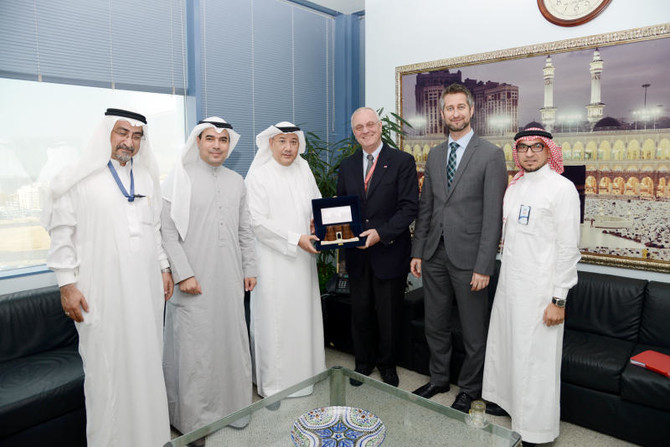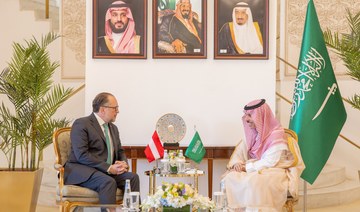Saudi Arabia is the most important market for Austria in the Middle East. Emphasizing this, Stefan Pistauer, regional director Africa/Middle East Advantage Austria, Austrian Federal Economic Chamber, says the trade volume between the two countries could break the 1 billion-euro barrier for the first time.
In 2011 a new record high in exports to Saudi Arabia was reached — 534 million euros. The preliminary figures for 2012 show another increase by 5 percent of the exports and 95 percent of the imports. While Austrian exports consist of many products, such as pharmaceuticals, energy drinks, fruit juice, timber, paper, special vehicles, machines
for various sectors, steel, steel and plastic products, railway tracks, and furniture, the imports from Saudi Arabia are mainly of crude oil.
Pistauer gave these details on the occasion of the four-day trade delegation, organized by the commercial section of the Austrian Embassy and the Austrian Federal Economic Chamber, which ends today.
Accompanying the delegation is Austrian Vice-Chancellor and Minister of Foreign Affairs Michael Spindelegger. Twenty-three Austrian companies are representing the delegation showing their strong interest in the Saudi market.
The delegation first visited Jeddah and then Riyadh. The firms from various sectors have been holding B2B talks with leading Saudi counterparts in both cities.
“Austrian quality and know-how has an excellent reputation all over the world and especially in the Middle East,” Pistauer said. Many small and medium sized companies are specialized on niche products and solutions for the unusual projects. The delegates offer know-how in the health sector, nuclear medicine, warehouse automation, security
solutions, test equipment for the aerospace industry, furnishings for banks, hydro-mechanical deep drawing, timber, theme parks, road safety barriers, egg packaging, etc.
While in Jeddah, Pistauer and Pierre Prunis, commercial counselor at the Austrian Embassy in Riyadh paid a courtesy visit to JCCI Secretary General Adnan Mandourah.
One of the main subjects discussed was the bilateral trade between the two countries. It was mentioned that the common activities between both countries should be promoted by each side and enforced through bilateral trade missions as well as conferences and market support for companies.
The structural comparison of the Austrian and Saudi chambers of commerce systems and their impact on the development of the economies of both countries were also discussed. “One main outcome of this discussion was that Saudi Arabia and Austria are strongly promoting and developing their economies through the chambers and use these
frameworks as a commercial and economic tool in order to bring forward stability through sustainable economic growth,” Pistauer said.
Saudi-Austrian trade to exceed 1 billion-euro mark
Saudi-Austrian trade to exceed 1 billion-euro mark

Saudi Arabia and Austria sign MoU for economic cooperation

VIENNA: Saudi Arabia’s economy ministry and its Austrian counterpart signed a memorandum of understanding to boost economic cooperation between the two nations.
The Saudi Ministry of Economy and Planning Austria’s Ministry of Labor and Economy in the deal on the sidelines of the Saudi-Austrian Joint Committee held in the Austrian capital.
The MoU was signed by the Saudi Minister of Economy and Planning Faisal bin Fadel Al-Ibrahim, and the Austrian Minister of Labor and Economy, Martin Kocher.
The MoU aims to diversify and strengthen economic ties, exchange experiences and information, and encourage cooperation in a number of fields, including trade, industry, research and development, tourism, small and medium enterprises.
Among the content of the MoU is the organization of conferences, seminars and the exchange of visits between experts, in addition to cooperation between government institutions and the private sector.
The parties are also committed to protecting intellectual property rights and exchanging information for the purposes specified in the MoU.
This MoU comes within the framework of a cooperation agreement in the economic, commercial, industrial and technical fields signed between the two governments in 2004.
Xi calls for more jobs for youth, migrant workers

- (We should) insist that employment of young people including college graduates is a top priority: Chinese president
BEIJING: China’s President Xi Jinping called on Monday for efforts to promote high-quality and sufficient jobs for college graduates and migrant workers, while presiding over a Politburo group study session, state media Xinhua reported on Tuesday.
“(We should) insist that employment of young people including college graduates is a top priority,” the Xinhua report quoted Xi as saying at a group study session of the Politburo, a top decision-making body of the ruling Communist Party.
The Xinhua report did not give details on job promotion support measures or plans.
The survey-based jobless rate for 16-24 year-olds, excluding college students, was 14.7 percent in April, down from 15.3 percent in March, official data showed last week.
China’s statistics bureau revised its methodology by removing college students from the survey pool after youth jobless rate surged to around 20 percent last year.
Xi also said the government should take steps to promote the employment of migrant workers, guide them to return to their hometowns and for people to start businesses in the countryside.
He called for stabilizing the income of people who had been lifted out of poverty and preventing large-scale return to poverty due to unemployment, Xinhua said.
Companies and industries with strong job creation capabilities will be supported, the report said.
China created 4.36 million new urban jobs in the first four months, Human Resources Ministry data showed, 36 percent of its annual job creation target.
Saudis spent more money on electronic devices during the 4th week of May: SAMA data

RIYADH: Saudi Arabia’s point-of-sale spending reached SR11.2 billion ($2.98 billion) in the fourth week of May, official figures showed.
The latest data from the Saudi Central Bank, also known as SAMA, revealed that spending on electronic and electric devices surged by 9.5 percent to reach SR240.4 million.
Beverages and food, which accounts for the largest share at 14.9 percent, saw a 5.9 percent decline, reaching SR1.66 billion, during the week from May 19 to 25.
Meanwhile, transactions at restaurants and cafes, holding a 14.6 percent share, recorded a slower decline of 4.8 percent, amounting to SR1.64 billion.
Saudi spending on miscellaneous goods and services, including personal care items, supplies, maintenance, and cleaning, constituted the third-highest share and witnessed a 5.1 percent decline that week, reaching SR1.36 billion.
Despite composing only 1 percent of the week’s overall POS value, spending on education recorded a minimal increase of 0.1 percent to SR152.48 million.
In the past few years, this sector has been allocated the largest share of government expenditure in comparison to other divisions of the economy.
Efforts are underway to revamp the education system, aiming to equip the national workforce with the necessary skills to thrive in a technological and information-centric global economy.
The hotel sector experienced the largest decline in POS transaction value, dropping 10.9 percent to SR227.13 million.
According to data from SAMA, 35.44 percent of POS spending occurred in Riyadh, with the total transaction value reaching SR3.97 billion. However, this represents a 1.6 percent decrease from the previous week.
Riyadh has undergone considerable expansion, evolving into a pivotal center for growth and progress. The city is witnessing a surge in new businesses setting up operations, drawn by its vibrant economic landscape and strategic prospects for investment and innovation.
Spending in Jeddah followed closely, accounting for 14.3 percent of the total and reaching SR1.60 billion; however, it marked a 3.1 percent weekly drop.
The two cities that registered the highest declines in POS spending were Makkah and Madinah, with decreases of 11 percent and 6.8 percent, respectively. The value of transactions in Makkah reached SR380.98 million, while in Madinah, it was SR393.26 million.
Saudi healthcare to advance with major digital tech partnership

RIYADH: The Saudi healthcare system is set to advance as two of the country’s major companies partner to leverage digital technologies to enhance the Kingdom’s capabilities.
SAMI Advanced Electronics Co., a wholly owned subsidiary of SAMI, the nation’s defense and digital solutions provider, has signed a cooperation agreement with the National Unified Procurement Co., a Public Investment Fund company.
The agreement, signed on May 27, will provide solutions for medication tracking and IT infrastructure and increase local content through medical devices manufacturing and maintenance.
This partnership demonstrates SAMI-AEC’s unremitting efforts to build a harmonious and applicable healthcare system in Saudi Arabia based on digital technologies.
Ziad Al-Musallam, CEO of SAMI-AEC, commented on the agreement, saying that they are honored to collaborate with NUPCO, as this deal underscores the unwavering commitment of both entities to bolstering efforts aimed at enhancing the healthcare ecosystem in Saudi Arabia.
“At SAMI-AEC, we firmly believe in the significance of augmenting public health services through digital solutions and delivering e-health services. This involves integrating effective, fast technologies to empower the healthcare sector, aligning with the objectives of Saudi Vision 2030,” he said.
Fahad Al-Shebel, CEO of NUPCO, highlighted the agreement’s importance and its role in fortifying the healthcare infrastructure and facilitating access to the integrated technology offered by SAMI-Advanced Electronics Co.
Aiming to upgrade the healthcare sector by improving its facilities in all public hospitals and medical centers in the Kingdom, NUPCO is the country’s largest central company providing medical purchasing, storage, and distribution services for medicines, devices, and supplies.
With a workforce of over 3,320 individuals, 85 percent of whom are Saudi nationals, SAMI-AEC has positioned itself as a leader in electronics, technology, engineering, and manufacturing. Its services span sectors such as defense and aerospace, digital, energy, and security.
Over 800 of the company’s employees are engineers and certified experts, reaffirming the dedication of SAMI-AEC, which was established in 1988, to excellence and innovation.
On the other hand, NUPCO was established in 2009 with SR1.5 billion in capital. It is the leading company in Saudi Arabia in procurement, logistics, and supply chain management for pharmaceuticals, medical devices, and supplies for governmental hospitals.
Closing Bell: Saudi main index continues downward trend to close at 11,660

RIYADH: Saudi Arabia’s Tadawul All Share Index continued its downward movement for the third consecutive session this week, as it shed 171.28 points to close at 11,659.94 on Tuesday.
The total trading turnover of the benchmark index was SR5.34 billion ($1.42 billion), with 23 stocks advancing and 202 declining.
The Kingdom’s parallel market, Nomu, also slipped by 0.81 percent to 26,234.79, while the MSCI Tadawul Index shed 20.97 points to close at 1,449.44.
The best-performing stock on the main index was Sustained Infrastructure Holding Co. The firm’s share price soared by 6.2 percent to SR34.25.
Other top performers were the Mediterranean and Gulf Insurance and Reinsurance Co. and AYYAN Investment Co., whose share prices edged up by 3.98 percent and 3.63 percent respectively.
The worst-performing stock on the benchmark index was Saudi utility giant ACWA Power, as its share price slid by 4.68 percent to SR456.60.
On the announcements front, Etihad Atheeb Telecommunication Co. said that it was awarded two projects worth SR45.51 million by Technical and Vocational Training Corp. to provide dedicated Internet services in 77 locations.
In a Tadawul statement, the telecommunication provider said that the first project has a value of SR23.64 million, while the second one amounts to SR21.87 million.
Meanwhile, Mouwasat Medical Services Co. announced that its shareholders have approved the board’s recommendation to distribute a 17.5 percent cash dividend, or SR 1.75 per share for 2023.
In March, Mouwasat Medical Services Co. had revealed that its net profit witnessed a growth of 10 percent in 2023 to SR657.7 million, compared to the previous year.
Al Moammar Information Systems Co., on Tuesday, revealed that it received new orders to increase the capacity of data centers at a total value of SR 75.2 million.
In a statement to Tadawul, the company added that further developments of the order will be unveiled in due course.













